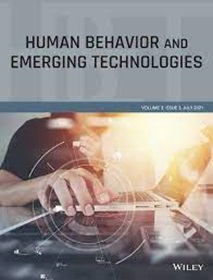社交媒体使用与家庭联系和父母监督的关系:巴基斯坦青少年调查研究
IF 4.3
Q1 PSYCHOLOGY, MULTIDISCIPLINARY
引用次数: 0
摘要
在巴基斯坦这样的集体主义家庭文化中,越来越多的年轻人使用社交媒体平台,但人们对社交媒体的使用与这一人群的家庭联系之间的关系知之甚少。本研究旨在(a)研究巴基斯坦年轻人的社交媒体使用模式,以及他们如何使用社交媒体与父母联系;(b)探索社交媒体使用与感知的家庭联系和父母监控之间可能存在的关联。数据来自一项针对巴基斯坦年轻人的在线调查。记录了各种流行社交媒体平台的使用模式。此外,还测量了家庭连通性和父母监控。使用多元线性回归分析来检验用于与父母联系的社交媒体与家庭联系和父母监控之间的关系。共有421名参与者参与了这项调查。所有参与者都经常使用至少两个流行的社交媒体平台。无论性别或年龄,WhatsApp都是使用最多的平台,约91%的参与者表示每天都会使用WhatsApp。总体而言,63%的参与者通过社交媒体与父母联系。这在男性和女性参与者中差异很大,69%的女性参与者在社交媒体上与父母联系,而男性的这一比例为59%。在调整年龄和性别之前和之后,在Facebook和Instagram上与父母联系与参与者对父母监控的看法高度相关。该研究强调,尽管在巴基斯坦等集体主义社会中,家庭联系与社交媒体使用无关,但成年子女认为父母在监控他们的社交媒体活动。本文章由计算机程序翻译,如有差异,请以英文原文为准。
Association of Social Media Use with Family Connectedness and Parental Monitoring: A Survey Study of Young Adults in Pakistan
An increasing number of young adults are using social media platforms in collectivist family cultures like Pakistan, but little is known about how social media use is associated with family connectedness in this population. This study is aimed (a) at examining the social media usage patterns in Pakistani young adults and how they use it to connect with their parents and (b) at exploring the possible association between social media use and perceived family connectedness and parental monitoring. Data came from an online survey conducted among young adults in Pakistan. Patterns of use across various popular social media platforms were recorded. Additionally, family connectedness and parental monitoring were measured. Multiple linear regression analyses were used to examine the relationship between social media used to connect with parents and family connectedness and parental monitoring. A total of 421 participants responded to the survey. All participants regularly used at least two popular social media platforms. WhatsApp was the most used platform irrespective of gender or age, with about 91% of the participants reporting daily usage. Overall, 63% of participants connected with their parents using social media. This varied significantly among male and female participants with 69% of female participants connecting with their parents on social media compared to 59% of males. Connecting with parents on both Facebook and Instagram was highly associated with participants’ perception of parental monitoring before and after adjusting for age and gender. The study highlights that while family connectedness in collectivist societies like Pakistan is not associated with social media usage, adult children perceive parents monitoring their social media activities.
求助全文
通过发布文献求助,成功后即可免费获取论文全文。
去求助
来源期刊

Human Behavior and Emerging Technologies
Social Sciences-Social Sciences (all)
CiteScore
17.20
自引率
8.70%
发文量
73
期刊介绍:
Human Behavior and Emerging Technologies is an interdisciplinary journal dedicated to publishing high-impact research that enhances understanding of the complex interactions between diverse human behavior and emerging digital technologies.
 求助内容:
求助内容: 应助结果提醒方式:
应助结果提醒方式:


